Wondering how much do it cost to start a cleaning business? Typically, you’ll need between $2,000 and $10,000. This covers equipment, supplies, legal fees, and initial marketing. In this guide, we’ll break down each expense to help you plan your budget effectively.
Key Takeaways
- Startup costs for a cleaning business range from $2,000 to $10,000 depending on service type, with essential equipment, legal fees, and supplies forming the bulk of expenses.
- Choosing between residential and commercial cleaning impacts investments and income stability, with residential offering quicker payments and lower costs, while commercial can lead to larger contracts and steadier revenue.
- Investing in essential equipment, a solid marketing strategy, and training for staff is crucial for delivering high-quality services and ensuring long-term success in your cleaning business.
Estimating Initial Cleaning Business Startup Costs
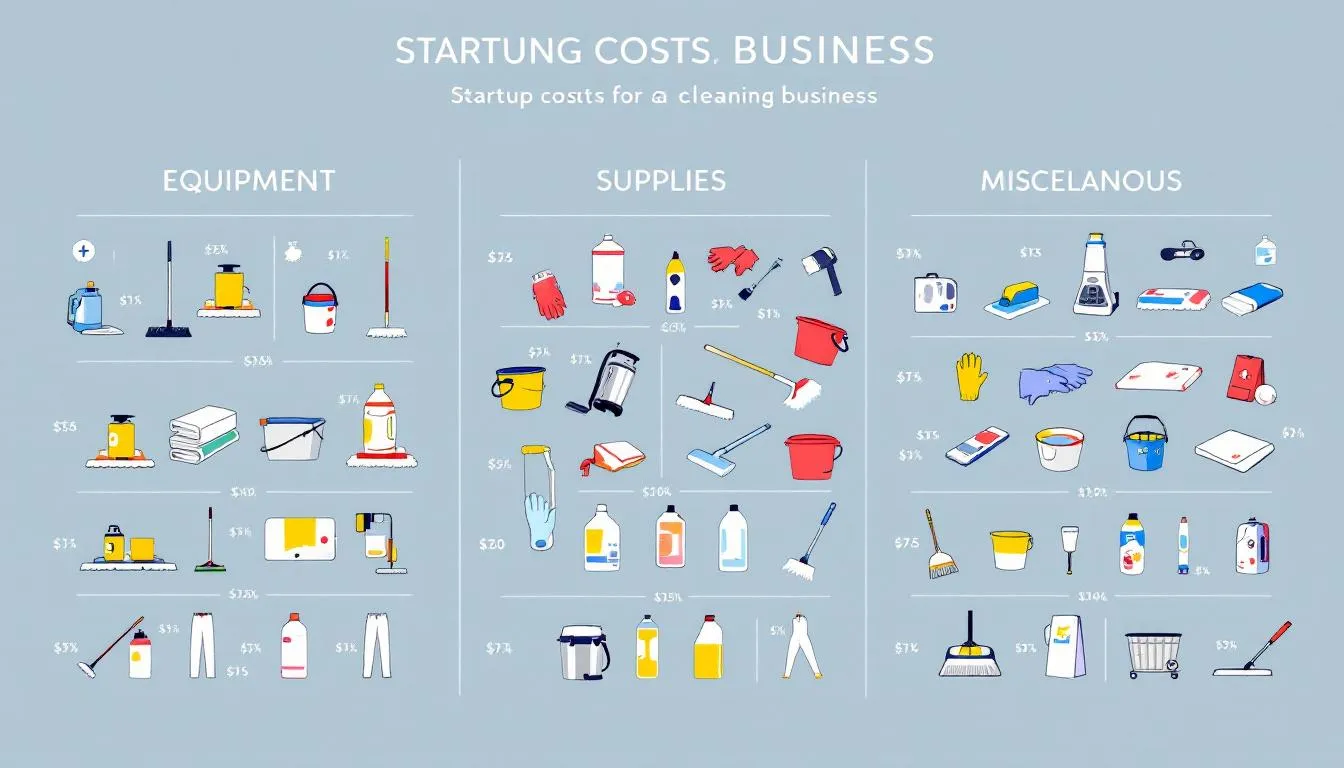
The estimated cost to start a cleaning business can range from $2,000 to $10,000, depending on the scale and type of services you plan to offer. These startup costs typically include:
- Equipment purchases, which can range from $500 to $2,000 depending on the quality and type needed for your services
- Legal fees, including obtaining the necessary licenses and permits, usually ranging from $100 to $800
- Supplies, which are crucial for setting up a reliable and efficient cleaning operation
Understanding these costs is critical for financial planning and ensuring you can cover all necessary expenses without overspending.
Initial investments often consist of purchasing essential cleaning equipment, such as:
- Brooms
- Mops
- Vacuum cleaners
- Dusters
These items are fundamental to providing high-quality cleaning services and maintaining customer satisfaction. Additionally, investing in cleaning supplies, such as cleaning solutions, chemicals, trash bags, and cleaning products, is essential for everyday operations. Scouring wholesale websites for bulk discounts can help reduce these costs and maximize your budget. Prioritizing these initial investments helps ensure you have the necessary tools to start your cleaning business effectively.
Beyond the basics, it’s important to consider potential additional costs, such as office space and utilities, especially if you plan to expand your small business in the future. Starting from home can save on these initial costs, but long-term planning should include evaluating rent and utility bills. Proper financial planning and budgeting are crucial for competitive pricing and making informed business decisions. Estimating and understanding your startup costs enables you to set realistic financial goals and build a solid foundation for your cleaning business and a comprehensive business plan.
Choosing Between Residential and Commercial Cleaning Services
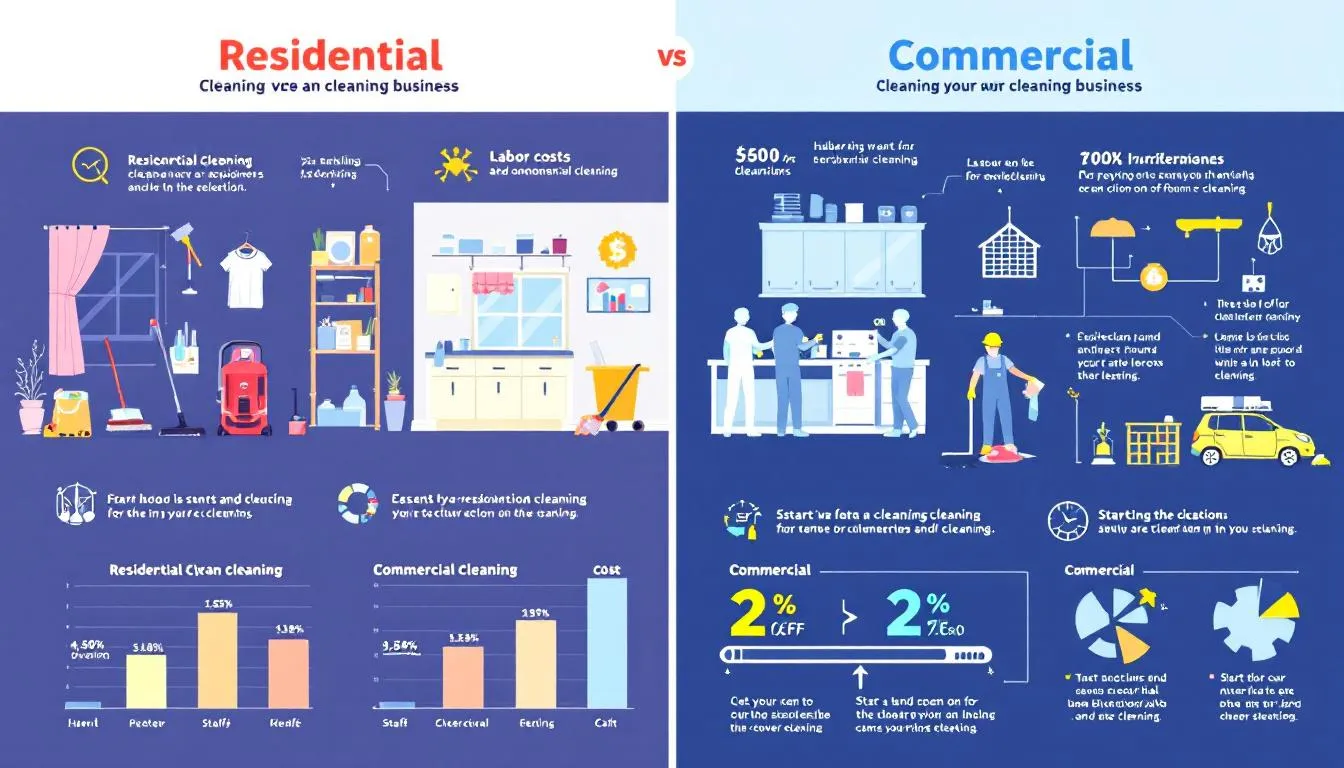
Deciding between residential and commercial cleaning services significantly impacts your startup costs, business model, and target market. Starting a residential cleaning business typically involves:
- A lower initial investment, as many supplies may already be on hand.
- More detailed and slower cleaning processes.
- Quicker payments since clients usually pay directly after services are rendered.
On the other hand, commercial cleaning often requires specialized equipment and higher insurance coverage, leading to greater startup costs. However, commercial cleaning services and specialized cleaning services generally have the potential for higher profits due to larger contracts and a more stable income stream.
While residential cleaning allows for a more personal touch and less competition due to a greater number of available customers, commercial cleaning contracts often provide a more stable income stream due to their larger size and the structured nature of business budgets. Commercial cleaning may also involve waiting for payments up to 90 days, which requires better cash flow management.
Less competition exists in residential cleaning, making it easier to establish a client base quickly. However, commercial cleaning services cater to a variety of clients, including office buildings, medical facilities, and commercial residential buildings, offering diverse opportunities for growth, including janitorial service options. Many businesses turn to cleaning companies to meet their needs.
The choice between residential cleaning and commercial cleaning services hinges on your business goals, budget, and personal preferences. If you prefer a more personal connection with clients and quicker payments, a residential cleaning company might be the better option. Conversely, if you’re looking for larger contracts and a more stable income stream, commercial cleaning could be the way to go.
Evaluating the pros and cons of each service type helps you make an informed decision aligned with your vision for a successful cleaning business.
Essential Equipment and Supplies for Cleaning Businesses
Investing in essential equipment and supplies is necessary for ensuring high-quality service delivery in a cleaning business. The equipment costs of purchasing cleaning equipment can range from $500 to $2,000, depending on the quality and type of equipment needed. Essential tools for cleaning services include:
- Brooms
- Mops
- Vacuum cleaners
- Dusters
Additionally, cleaning solutions, cleaning chemicals, and trash bags are necessary for everyday operations in the cleaning industry. Buying these items in bulk can lead to significant cost savings, a recommended strategy for new cleaning businesses and those considering a cleaning franchise.
Beyond the basic equipment, additional specialized tools may be required depending on the services offered. For example, professional cleaning machines may be needed for carpet cleaning or floor waxing. Conducting market research helps identify the specific equipment needed for your target market and potential customers, ensuring investment in high-quality, durable tools. Scouring wholesale websites for bulk discounts can help reduce these costs and maximize your budget.
One key consideration when acquiring equipment is whether to buy or lease. Both options have their advantages and disadvantages, which will be discussed in detail in the next section. An informed decision on this front helps manage costs effectively, ensuring you have the necessary tools for top-notch cleaning services.
Buying vs. Leasing Cleaning Equipment
Deciding whether to buy or lease cleaning equipment is a crucial decision for new cleaning business owners. Buying cleaning equipment requires a larger initial investment but can lead to long-term savings since there are no recurring rental payments. Ownership also means you can maintain and use the equipment as needed without worrying about lease agreements or usage restrictions. However, the upfront costs can be significant, and you’ll need to budget for maintenance and potential repairs.
Leasing equipment can offer several advantages:
- Lower upfront costs
- Access to newer technology
- More flexibility, allowing upgrades to newer equipment at the end of the lease term
- Inclusion of maintenance and repair services, reducing the burden on your budget
However, over time, leasing can be more expensive than buying due to ongoing rental payments. Ultimately, the decision between buying and leasing should consider both the short-term and long-term financial impacts to determine the best option for your cleaning business.
Legal and Administrative Costs
Acquiring the necessary licenses and permits is crucial for legally operating a cleaning service and avoiding legal complications. The estimated legal and administrative cost to start a cleaning business usually ranges from $100 to $800. These costs include acquiring licenses and permits, which help build client trust and ensure compliance with local regulations. Complying with legal requirements is vital for building client trust and avoiding legal issues.
The type of licenses required for a cleaning business can vary depending on other local businesses regulations and the services provided. Costs for obtaining a business license are often necessary for tax purposes and to operate a cleaning business legally.
Prioritizing legal and administrative costs during the startup phase ensures smooth, compliant operations, paving the way for long-term success.
Importance of Insurance for Cleaning Businesses
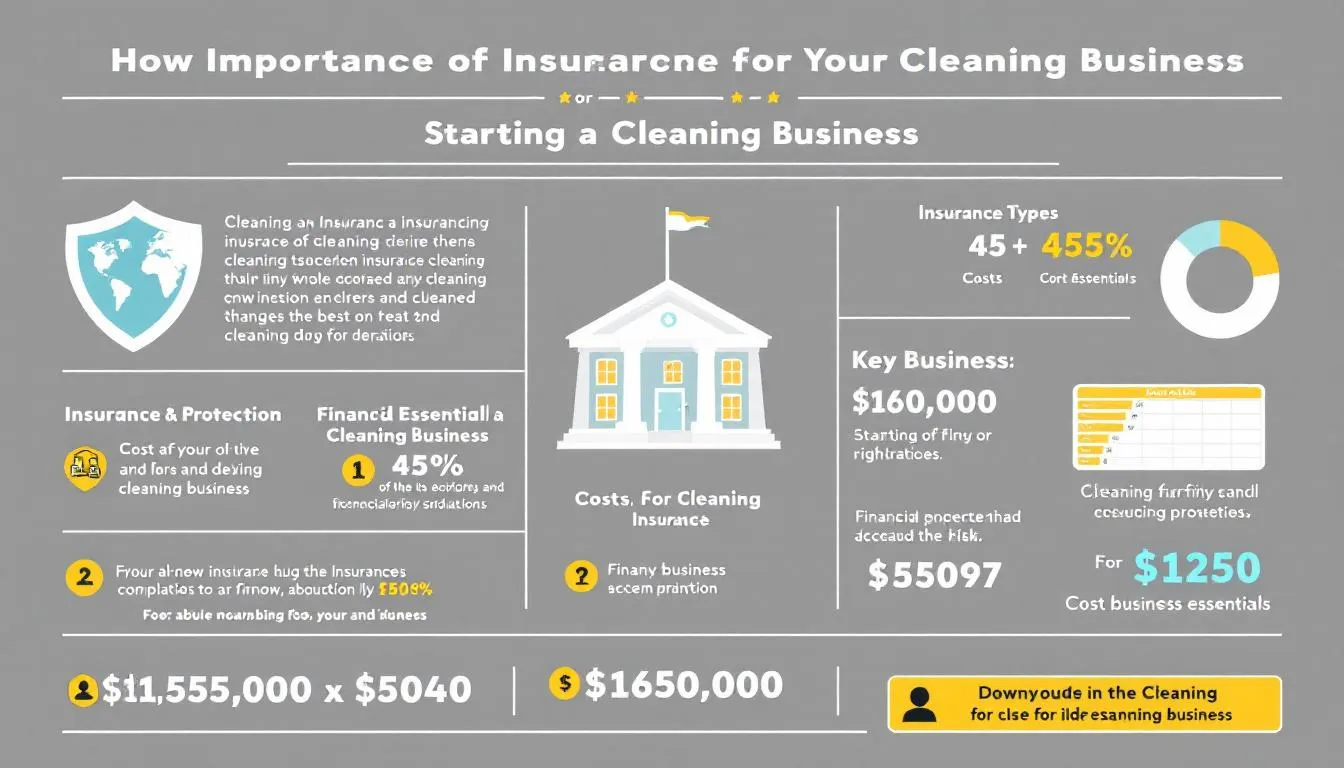
Insurance is vital for a cleaning business, shielding it from unexpected financial burdens due to accidents, property damage, and lawsuits. Annual insurance costs for a cleaning business can vary from $500 to $1,500, reflecting the importance of adequate coverage. Having insurance is often a legal requirement, particularly for businesses with employees, to cover worker injuries. Workers’ compensation insurance is crucial for covering medical treatments for work-related injuries and wages during recovery.
Clients may demand proof of insurance before hiring a cleaning service to ensure protection against risks for their cleaning clients. Insurance coverage not only provides peace of mind but also demonstrates professionalism, which can enhance client trust and potentially save money in the long run.
Additionally, specialized insurance policies such as Employee Theft coverage and Cyber Insurance can safeguard businesses from financial losses related to theft allegations and data breaches, respectively. The right insurance coverage is crucial for protecting your cleaning business and maintaining a professional reputation.
Marketing and Advertising Expenses
Marketing and advertising are vital components of starting a cleaning business, as they help attract clients and build a brand presence. Initial marketing and advertising expenses are typically estimated between $300 and $1,000. Effective marketing strategies can include a combination of online ads, print media, and networking to reach your target market.
Creating a professional website is crucial for establishing an online presence and can cost anywhere from $250 to $10,000, depending on the complexity and features. Allocating about 8% of annual revenue to marketing and advertising is recommended to maintain a consistent promotional effort and attract new customers.
Investing in marketing and advertising boosts brand awareness, attracts potential clients, and establishes a strong foundation for your cleaning business.
Transportation and Fuel Costs
Reliable transportation enables a cleaning business to provide on-site services and transport supplies and equipment effectively. Transportation costs can significantly vary, often exceeding $5,000, based on whether vehicles are owned, rented, or leased. The estimated cost range for purchasing a company vehicle for a cleaning business is $5,000–$20,000. Using a dedicated business vehicle can help avoid personal liability issues related to business operations.
Vehicle maintenance is critical, as regular checks can prevent costly repairs and downtime. Implementing a fuel-efficient driving strategy can lead to savings on fuel consumption, especially with average gas prices over $3.00 per gallon.
Personal vehicles may incur wear and tear when used for cleaning business activities, so investing in a reliable cleaning company vehicle is advisable. Effectively managing transportation and fuel costs ensures smooth operations and cost-efficiency for your own cleaning business.
Training and Development Costs
Training and developing cleaning staff is crucial for ensuring top-quality services and enhancing efficiency. The estimated cost to train a new cleaning crew member is just over $1,000, though specific investments can range between $100 and $500. Proper training should include classroom sessions that cover operational procedures, safety protocols, and customer service skills. This investment results in lower risk of attrition and cost savings through enhanced workplace safety and efficiency.
Proper training ensures your cleaning staff can deliver high-quality services, maintain safety standards, and interact professionally with clients. This not only improves customer satisfaction but also contributes to the overall success and growth of your cleaning business.
Additional Costs to Consider
In addition to the primary startup costs, there are several additional costs to consider when starting a cleaning business:
- Office rental costs, which may vary based on the size and location, impacting initial expenses.
- Rent and utility bills, which are essential to evaluate for long-term planning.
- Starting from home, which can save costs initially.
- Additional start up costs such as more equipment, better team members, office space, and utilities.
Planning for these additional costs ensures a comprehensive budget and effective financial management. By anticipating these expenses through careful planning, you can create a solid financial foundation for your cleaning business and avoid unexpected financial challenges.
Hiring Employees and Managing Wages
Competitive wages attract skilled cleaning staff and ensure high-quality service delivery. A payroll system is necessary for efficiently managing employee wages and benefits when hiring employees. Offering employee benefits like health insurance and paid time off can significantly improve staff retention and morale.
Commission-based payment structures can motivate cleaning staff to upsell services to clients, enhancing overall revenue. Fair remuneration based on experience and skill level can influence employee performance and job satisfaction.
Regularly reviewing employee workloads will help prevent burnout and maintain productivity levels. Effective management of wages and benefits builds a motivated and dedicated team, contributing to the long-term success of your cleaning business.
Utilizing Technology to Manage Your Cleaning Business
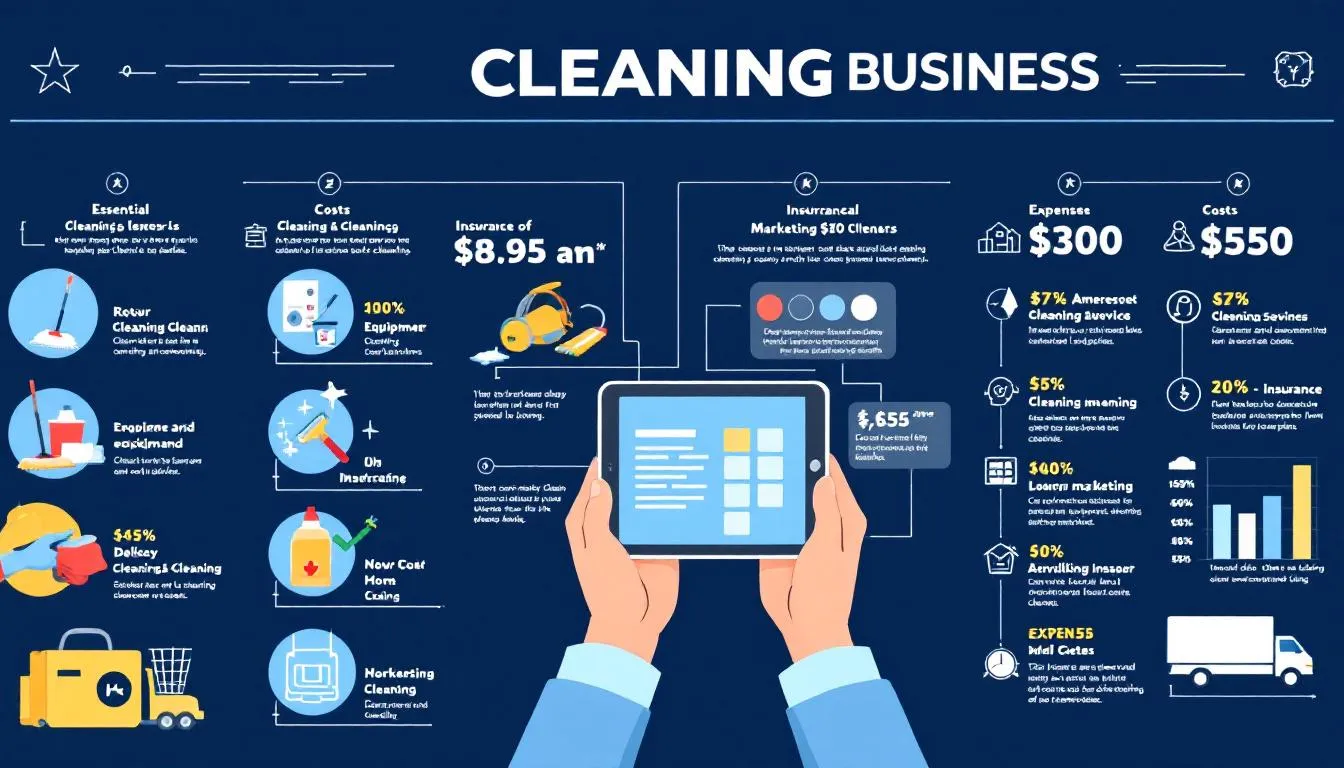
Technology significantly enhances the efficiency and effectiveness of cleaning business operations. Cleaning management software like MaidProfit can streamline operations, improve scheduling, and manage client information, leading to increased productivity and client satisfaction. MaidProfit allows cleaning businesses to easily manage online bookings, payments, and client communication, enhancing both client and employee satisfaction.
MaidProfit provides business owners with productivity reports and payment tracking features, ensuring informed decision-making. The software also offers educational resources and features to support growth, ensuring that cleaning businesses thrive as they scale. Technology like MaidProfit helps manage day-to-day operations efficiently, contributing to a successful cleaning business.
Preparing for Unexpected Expenses
Having a financial buffer is essential to handle unexpected expenses and emergencies in a cleaning business. It is recommended to set aside 10 to 20% of the operating budget for unexpected costs. Setting aside a contingency fund is crucial for managing unforeseen costs such as equipment failure or client cancellations. Unexpected costs in a cleaning business can include equipment failures, client cancellations, and unforeseen operational expenses.
Proper planning and maintaining a financial buffer ensures your cleaning business can weather unexpected challenges. Preparing for these costs helps maintain smooth operations and avoid financial strain.
How MaidProfit Can Help Minimize Startup Costs
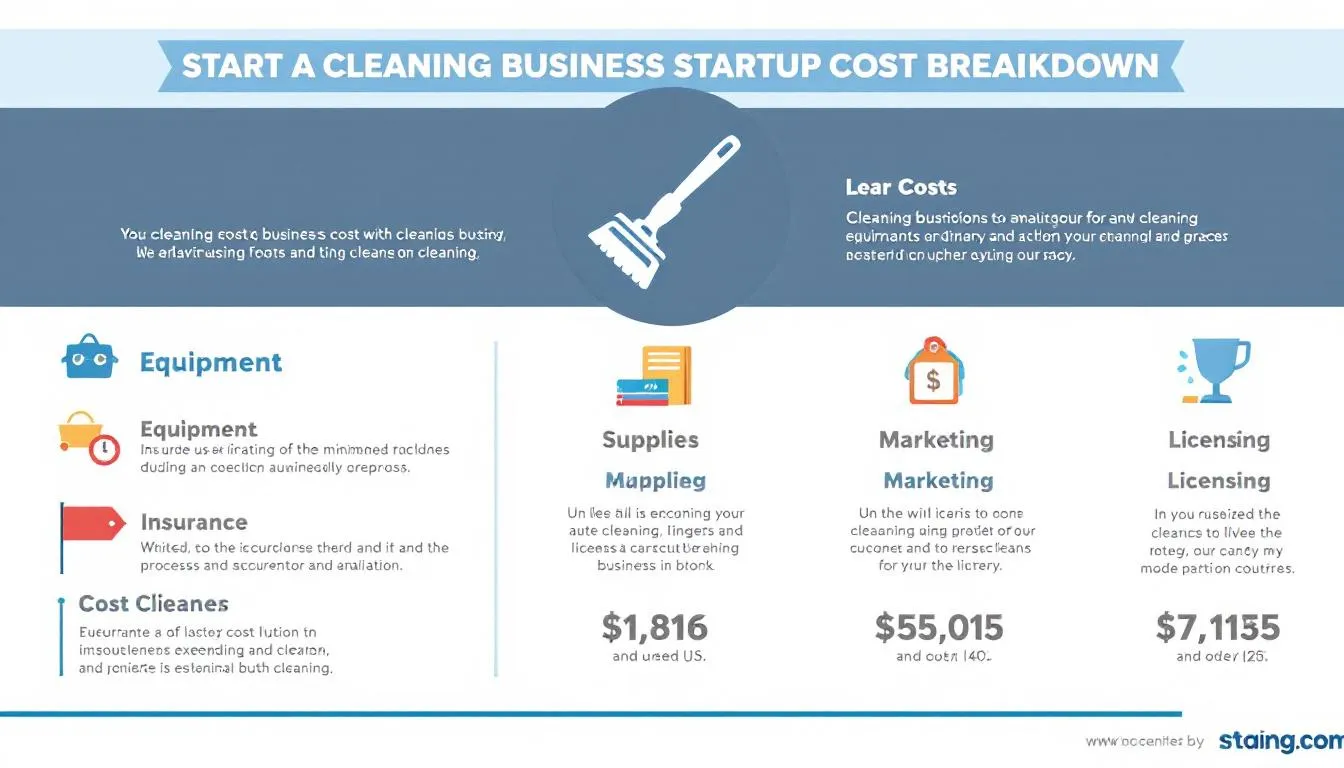
Starting a cleaning business involves various startup costs, but using a platform like MaidProfit can help minimize these expenses and streamline your operations. MaidProfit offers several benefits:
- Automates client follow-ups and reminders, helping increase repeat business and maintain a steady cash flow.
- Reduces the need for extensive marketing efforts, saving on advertising costs.
- Provides smart scheduling and route optimization features to ensure efficient team operations.
- Cuts down on fuel and transportation expenses through optimized routes.
MaidProfit also offers comprehensive tools for managing day-to-day operations, including online marketing bookings, payment tracking, and client communication for recurring clients. These features not only save time but also reduce administrative costs by centralizing your business operations.
Leveraging MaidProfit allows you to focus on excellent cleaning services while keeping expenses in check, setting the stage for a successful and profitable cleaning business.
Summary
Starting a cleaning business requires careful planning and budgeting to cover various startup costs, from equipment and supplies to legal fees and marketing expenses. Understanding and estimating these costs is crucial for setting realistic financial goals and ensuring a smooth launch. Whether you choose to offer residential or commercial cleaning services, each type has its own set of advantages and challenges that must be weighed carefully.
By investing in essential equipment, obtaining the necessary licenses, securing insurance, and planning for additional costs, you can build a solid foundation for your cleaning business. Utilizing technology like MaidProfit can further enhance your operations, reduce costs, and improve client satisfaction. With proper planning, training, and a focus on quality service, you can create a successful and profitable cleaning business that stands out in the competitive cleaning industry.
Frequently Asked Questions
How much does it cost to start a cleaning business?
Starting a cleaning business can cost between $2,000 and $10,000, depending on your equipment and setup. With the right planning, you can turn this investment into a successful venture!
Should I choose residential or commercial cleaning services?
Choosing between residential and commercial cleaning services depends on your goals; if you prefer lower startup costs and quicker payments, go for residential. However, if you’re aiming for higher profits and more stable income, commercial cleaning might be the way to go!
What are the essential equipment and supplies needed for a cleaning business?
To launch a successful cleaning business, make sure to equip yourself with brooms, mops, vacuum cleaners, and effective cleaning solutions. Investing in the right tools not only boosts your efficiency but also ensures high-quality service that can impress your clients!
How important is insurance for a cleaning business?
Insurance is vital for a cleaning business as it shields you from unforeseen financial burdens, like accidents and lawsuits, while also reinforcing client trust. Don’t underestimate its role in safeguarding your success!
How can MaidProfit help reduce startup costs for my cleaning business?
MaidProfit can significantly lower your startup costs by automating client follow-ups and streamlining operations, which reduces the need for extensive administrative and marketing resources. Embrace this efficient solution to kickstart your cleaning business with less financial burden!